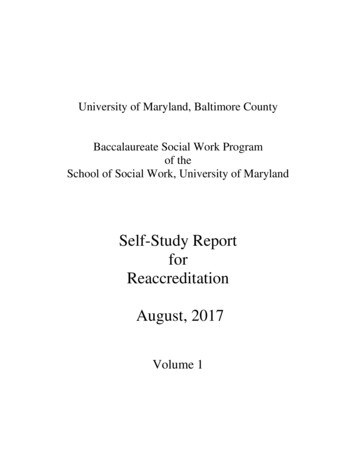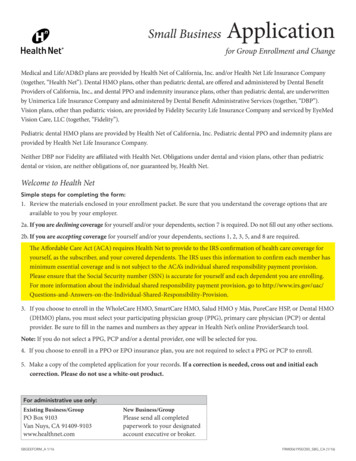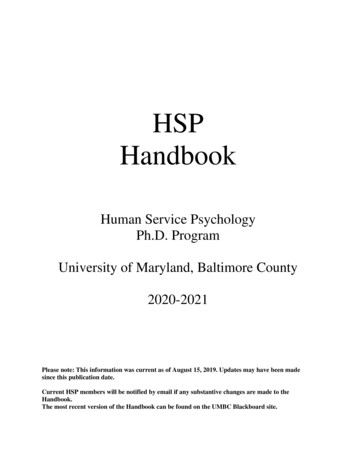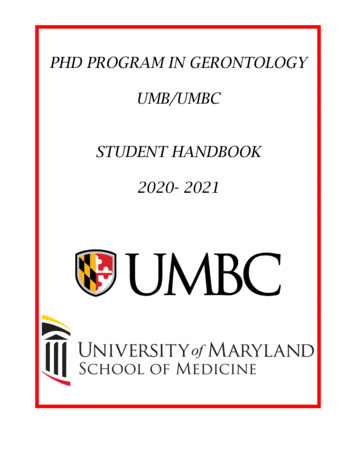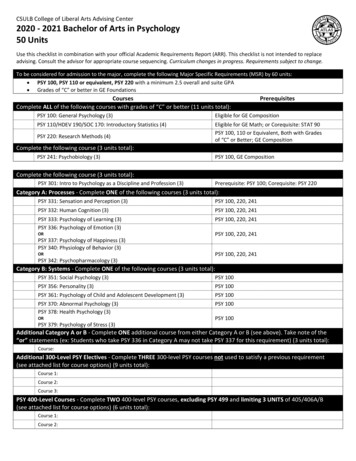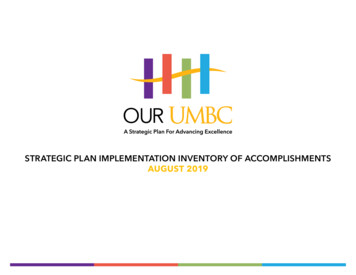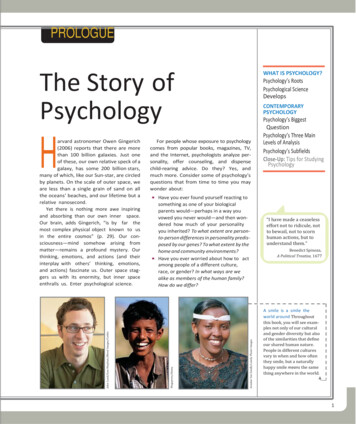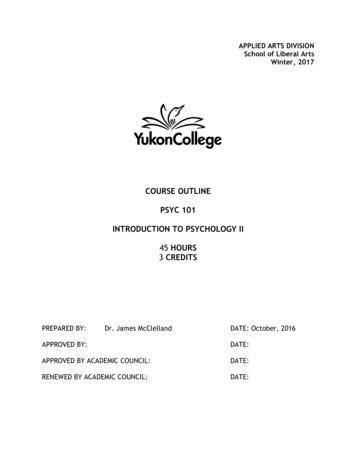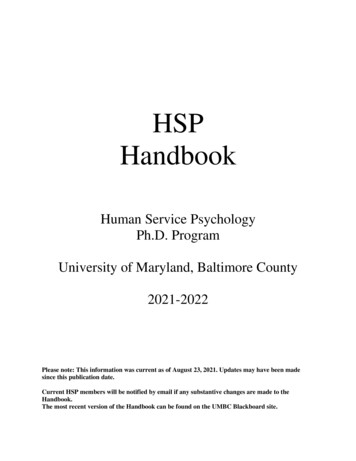
Transcription
HSPHandbookHuman Service PsychologyPh.D. ProgramUniversity of Maryland, Baltimore County2021-2022Please note: This information was current as of August 23, 2021. Updates may have been madesince this publication date.Current HSP members will be notified by email if any substantive changes are made to theHandbook.The most recent version of the Handbook can be found on the UMBC Blackboard site.
2021-2022 HSP Handbook rev August 2021I. Introduction and Program RationaleII. Program StructureOrganization of the Human Services Psychology ProgramTrack Placement and Changing TracksIII. Program Requirements (HSP Doctoral Program)CurriculumCourse Waivers and Transfer of CreditResearch (Master's, Dissertation, and Independent)PracticumQualifying ExaminationComprehensives PortfolioAdmission to CandidacyInternshipIV. Target Dates and Milestones (adopted June 26, 2018)V. EvaluationsVI. Organizational Plan and Rules of Procedure of the HSP ProgramVII. Student Records Policy (for students who graduated after December 2008)VIII. Other Concerns and ConsiderationsGraduate School Registration PoliciesCurrent Research Interests and Activities of HSP Faculty (08-15-2020)Appendix A – Sample course plans2
2021-2022 HSP Handbook rev August 20213I. Introduction and Program RationaleThis handbook is intended to provide students and other interested persons with a detaileddescription of the Human Services Psychology (HSP) Program. Combined with the GraduateSchool catalogue, it should answer most questions that students might have about programrequirements. However, students are also encouraged to make generous use of the counsel oftheir advisors, program directors, and each other in negotiating their way through the program.Others reading this handbook to learn about the HSP Program are also invited to contact thedirector of the HSP Program if they have any further questions about the program.Initiated in 1983, the HSP Program represents a reconceptualization of clinical psychology andseveral related specialties. The program's rationale derives from a general systems theoryperspective which focuses on the generic nature of the knowledge and skills upon which thesespecialties draw and the multidimensional nature of the problems with which they are concerned.We believe that this approach, which is more fully elaborated elsewhere,1 fosters a morecomprehensive and integrative approach to both research and professional practice. It alsorepresents a more cost-effective and flexible approach to professional training than mosttraditional single-specialty professional training programs since it allows us to provide trainingfor a number of specialties within the framework of a single program.Human Services Psychology is defined as that sector of professional psychology concerned withthe promotion of human well-being through the acquisition and application of psychologicalknowledge and principles concerned with the diagnosis, treatment, and prevention ofpsychological and physical disorders. Thus, the program is designed to prepare students tocontribute to the growth of knowledge in this area, as well as to apply this knowledge to a broadrange of human problems. Consequently, the program is based upon a scientist-practitionermodel of training (sometimes referred to as the Boulder Model) which aims to provide studentswith skills as both researchers and practitioners. We believe that, even though some students inthe HSP Program may not plan to follow research careers, it is their training as scientists, as wellas practitioners, which most fundamentally distinguishes them from other mental healthprofessionals and human services providers.The HSP Program uses a biopsychosocial approach as the integrative perspective for its trainingof human service providers and researchers. There is a commitment in course design andpracticum experience to understand the unique contributions of biological, psychological, andsocial aspects of human functioning as well as the substantial interactions of these threecomponents in almost every problem area addressed by human services psychology. We believethat HSP students should espouse this broader, interactive perspective in designating programinterests and developing their graduate program of studies. Thus, the HSP Program encourages afocus on the boundaries of biopsychosocial interactions as well as a solid understanding of eachindividual aspect in order to promote a more holistic and integrated approach to psychologyresearch, service and practice.Levy, L. H. (1984). The metamorphosis of clinical psychology: Toward a new charter as HumanServices Psychology. American Psychologist, 39, 486-494. (Copy available on request.)
2021-2022 HSP Handbook rev August 20214II. Program StructureThe HSP Program has an integrative conceptual structure encompassing three specialtycomponents (tracks) in: behavioral medicine; clinical psychology (APA accredited); andcommunity psychology. Within the HSP Program's conceptual framework, these tracks areregarded as differing primarily in their particular focus within the human services matrix and inhow they conceive of, and approach, the generic problems of diagnosis, treatment, andprevention of psychological and physical disorders. Thus, Behavioral Medicine (B-Med) focuseson problems involving relations between behavioral and biological levels of human functioning;problems more typically seen in medical settings; and problems related to physical health.Clinical Psychology focuses on problems involving behavioral and psychological functioning ofadults, children, and families, and includes assessment and treatment of those problems.Community Psychology focuses on the community settings, social resources, and humanservices policies that influence the effective functioning of both individuals and communities. Aswell, though not a formal specialty track, a course sequence emphasizing training in ChildClinical Psychology has also been developed.We believe the conceptualization of these three specialty tracks within the HSP Program offersstudents in each program a broader and richer educational experience (and the potential for amore integrative perspective) than they would otherwise receive. In addition, students areencouraged to combine areas of focus. Thus there is training spanning several tracks:Clinical/Behavioral Medicine, Clinical/Community, and Community /Behavioral Medicine. Aswell, the emphasis in Child Clinical Psychology could also be applied to either of the dual-tracktraining involving Clinical Psychology.ORGANIZATION OF THE HUMAN SERVICES PSYCHOLOGY PROGRAMHSP PROGRAM DIRECTOR: PITTSHSP PH.D. PROGRAM nYoonBeatty MoodyBediako*DahlquistKhambatyQuitonBeatty MoodyBediako*BrodskyFountainMatonNnawulezi* Currently on leaveApplied Behavior Analysis(MA phy
2021-2022 HSP Handbook rev August 20215This table presents the organization of the HSP Program and the faculty associated with each ofits specialty tracks. Administrative support is provided by the Graduate Programs Coordinator,Stephanie Totsch and Graduate Programs Specialist, Trevor Pitts. A listing of the faculty andtheir current research interests is provided in an appendix to this handbook.A. Track Placement and Changing TracksPlacement in one of the three HSP specialty tracks (B-Med, Clinical, Community) or combinedtracks is usually determined at the time of admission offers in consultation with the student’sfaculty mentor (advisor). Any changing of tracks (described below) assumes the student is ingood standing within the program (e.g., moving through the program on a timely basis,successfully passing the Qualifying Examination) and has discussed the change with theiradvisor. As well, the HSP Faculty may wish to meet and discuss ANY of the following trackchanges (even if not otherwise specified in the ‘typical’ descriptions below).Dropping a track. A dual-track student, having decided that dropping a track is in their bestinterest, should undertake the following steps to drop a track: 1) They should meet with, andobtain approval from, the respective directors of each track; 2) A formal letter signed by thestudent and their advisor should be provided to the HSP Program Director, copying the relevanttrack directors and advisor; 3) The letter will then be placed in the student's file.Adding a track. In some instances, a student might wish to add a track. This might be becausethey were initially enrolled in a single track and wish to become dual track. Alternatively, a dualtrack student may wish to drop one track and add another. Again, the student's first step is toensure, through discussion with their advisor, that adding a track is in their best interests. Thestudent must also meet with all relevant track directors (director of their current track and of thetrack they wish to add and director of the track, if relevant). A written request is then preparedand given to the HSP Program Director; copying all relevant track directors and the student'sadvisor. The request should indicate the student's request has support from their advisor and alltrack directors (as relevant). The request will then be brought to the full HSP faculty fordiscussion and a vote on the student's request. Note: Because of the highly structured nature ofthe course sequences in the Clinical track, students who were not initially admitted into theclinical program are not usually allowed to add the Clinical track.Switching tracks. This is tantamount to both dropping and adding a track. Ultimately, thestudent's request to switch tracks will be voted upon by the full HSP faculty and the studentshould follow the steps outlined under "Adding a track," above.B. Applied Behavioral Analysis track in HSP – terminal Master'sAn Applied Behavior Analysis track, offered in collaboration with the Kennedy KriegerInstitute’s Department of Behavioral Psychology, is also part of the Human Services Program,but is not part of the doctoral training program. HSP doctoral students are welcome to take ABAcourses, with ABA instructor permission.Note: a separate document (ABA Handbook) should be consulted by students enrolled in theABA terminal Master's program
2021-2022 HSP Handbook rev August 20216III. PROGRAM REQUIREMENTS (HSP DOCTORAL PROGRAM)All HSP students (regardless of track) take a common core of foundational and researchmethodology courses. These are referred to as core courses, and are listed below. Beyond these,each track requires a number of specialty courses and several electives and seminars; also listedbelow. In order to foster the broad, integrative perspective expected of graduates of the HSPProgram, students are also required to take at least one cross-track elective from each of thetracks outside their specialty area (see listing of approved cross-track electives in followingsections.). In some cases, a student may create a curriculum reflecting a unique combination oftracks. This would be acceptable, as long as a coherent rationale is provided for this combinationand it appears to the program faculty to represent a sufficient range and depth of knowledge andskills, and is consistent with APA accreditation criteria for the students in the ClinicalPsychology track, if relevant.The general principle followed in formulating all program requirements is of providing state-ofthe-art training in an integrative biopsychosocial model while also allowing a maximum offlexibility and individualized curriculum planning. The goal is to permit students to meet theireducational and professional objectives in the most timely and efficient fashion, consistent withaccepted national standards for education and training in psychology and with our program'scommitment to excellence. Students entering with a baccalaureate degree may expect that, on theaverage, the program will take the equivalent of 5-6 years of full-time study to complete. Thiswould include a one year internship for clinical psychology students, which is usually taken inthe student's fifth or sixth year. The minimum time required to complete the Clinical Psychologytrack is 5 years—a full-time equivalent of 4 years of study in residency at UMBC and oneadditional full-time equivalent year of clinical internship.Changes to the program requirementsSince we constantly seek to improve the HSP Program and keep it responsive to newdevelopments in the field, it is quite possible that program requirements will change during eachstudent's tenure in the program. This includes, but is not limited to: 1) courses will be added ordeleted from the curriculum, 2) courses being revised, 3) practicum requirements, and 4)structure of the Qualifying Examination. In no case would subsequent changes in the programrequirements be retroactively imposed upon students if the changes would result in lengtheningthe time required to complete the program (i.e., students may follow requirements at time ofmatriculation if changes to program requirements are more 'difficult' to achieve).A. CURRICULUMCredits listed in parentheses besides each course category are the minimum required for thatcategory. Courses followed by an *, **, or *** are typically taught each year, two years, or threeyears, respectively. (Note: Course scheduling may change depending on student interest andfaculty availability). Students should meet with their advisor prior to each semester to determinewhat course(s) should be taken in the upcoming semester.Examples of the general sequence of courses for the each track, track combination, and childfocus combination are presented in the Appendix. The first and second year Clinical curriculumhas the least amount of flexibility, since students must obtain fundamental clinical trainingbefore going on externships. The specific specialty courses, electives, and seminars will varywith the subprogram track elected by students and their particular interests, as will the totalnumber of credits.
2021-2022 HSP Handbook rev August 202171. HSP CORE COURSE REQUIREMENTS (9 COURSES 28 CREDITS)Required of all HSP students unless waived on basis of previous course work1. PSYC 602Biological, Cognitive and Developmental Bases of Behavior* (Core I)2. PSYC 603Personal, Social, Community and Cultural Bases of Behavior* (Core II)3. PSYC 608Human Diversity*4. PSYC 611Data Analytic Procedures I* (and lab)5. PSYC 686Ethical and Professional Issues in the Science and Practice of Psychology*6. PSYC 710Research Methods in Psychology*7. PSYC 711Data Analytic Procedures II* (and lab)8. Methods of Inquiry elective9. Topics in Diversity (first two semesters; 0 credits)Practicum and Research Requirements10. PSYC 601Clinical Training (2 credits) (The Clinic)11. PSYC 690Practicum (2 credits minimum)12. PSYC 799Master’s Thesis Research (6 credits) (billed at ½ rate)13. PSYC 899Doctoral Dissertation Research (2 semester minimum; 9 credits persemester; billed at 2/9th rate)2. TRACK COURSE REQUIREMENTS1. CLINICAL TRACKa. Traditional Clinical (11 courses 31 credits)1. PSYC 606 Adult Psychopathology*2. PSYC 620 Methods of Assessment I*3. PSYC 621 Methods of Assessment II*4. PSYC 622 Clinical Intervention I*5. PSYC 623 Clinical Intervention II*6. PSYC 630 Clinical Interviewing (1 credit)*Clinical Electives7. Advanced clinical seminar8. Cross-track elective in Community9. Cross-track elective in Behavioral Medicine10. Other Elective11. Other Elective
2021-2022 HSP Handbook rev August 20218b. Clinical/Behavioral Medicine (13 courses 34 credits)1. PSYC 606 Adult Psychopathology*2. PSYC 620 Methods of Assessment I*3. PSYC 621 Methods of Assessment II*4. PSYC 622 Clinical Intervention I*5. PSYC 623 Clinical Intervention II*6. PSYC 630 Clinical Interviewing (1 credit)*Clinical/Behavioral Medicine Courses and Electives7. PSYC 695Introduction to Behavioral Medicine8. PSYC 695Physiological Systems in Behavioral Medicine9. PSYC 695Clinical Intervention III10.Epidemiology (or another advisor-approved elective)(Child clinical students may substitute a child clinical or developmental course)11. Advanced Behavioral-Medicine seminar12. Cross-track elective in Community13. Topics in Behavioral Medicine (first 4 semester; 0 credits)c. Clinical/Community (13 courses 34 credits)1. PSYC 606 Adult Psychopathology*2. PSYC 620 Methods of Assessment I*3. PSYC 621 Methods of Assessment II*4. PSYC 622 Clinical Intervention I*5. PSYC 623 Clinical Intervention II*6. PSYC 630 Clinical Interviewing (1 credit)*Clinical/Community Courses and Electives7. PSYC 635 Community Psychology I: Theory**8. PSYC 636 Primary Prevention**9. PSYC 736 Applied Psychology and Public Policy**10. PSYC 695Community Psychology II: Practice**11. PSYC 695Program Evaluation**12. Cross Track Elective in Behavioral Medicine13. Topics in Community (first 4 semesters; 0 credits)d. Child Clinical (11 courses 31 credits)1. PSYC 606 Adult Psychopathology*2. PSYC 620 Methods of Assessment I*3. PSYC 622 Clinical Intervention I*4. PSYC 623 Clinical Intervention II*5. PSYC 630 Clinical Interviewing (1 credit)*Child Clinical Electives(Note: the electives follow the same structure as Clinical track but are met with very specificcourses to meet the Child Clinical training requirements)6. PSYC 751 Couple and Family Therapies** (Clinical seminar)7. Cross-track elective in Community Psychology8. PSYC 742 Child Health** (Cross track elective in Behavioral Medicine)9. PSYC 607 Developmental Psychopathology **10. PSYC 650 Child Clinical**11. Advisor-approved graduate level Developmental Psychology course
2021-2022 HSP Handbook rev August 20219e. Child Clinical/Behavioral Medicine (15 courses 40-credits)1. PSYC 606 Adult Psychopathology*2. PSYC 620 Methods of Assessment I*3. PSYC 622 Clinical Intervention I*4. PSYC 623 Clinical Intervention II*5. PSYC 630 Clinical Interviewing (1 credit)*Child Clinical/Behavioral Medicine Courses and Electives(Note: the electives follow the same structure as Clinical/Behavioral Medicine track but aremet with very specific courses to meet the Child Clinical training requirements)6. PSYC 695 Introduction to Behavioral Medicine**7. PSYC 695 Physiological Systems in Behavioral Medicine8. PSYC 695 Clinical Intervention III9. PSYC 742 Child Health (Behavioral-Medicine seminar)**10. Cross-track elective in Community11. PSYC 607 Developmental Psychopathology ** (substitution for Epidemiology)12. PSYC 650 Child Clinical**13. PSYC 751 Couple and Family Therapies**14. Advisor-approved graduate level Developmental Psychology course15. Topics in Behavioral Medicine (first 4 semesters, no credits)f. Child Clinical/Community (15-16 courses 40-43 credits)1. PSYC 606 Adult Psychopathology*2. PSYC 620 Methods of Assessment I*3. PSYC 622 Clinical Intervention I*4. PSYC 623 Clinical Intervention II*5. PSYC 630 Clinical Interviewing (1 credit)*Child Clinical/Community Courses and Electives(Note: the electives follow the same structure as Clinical/Community track but are met withvery specific courses to meet the Child Clinical training requirements)6. PSYC 635 Community Psychology I: Theory **7. PSYC 695 Community Psychology II: Practice**8. PSYC 636 Primary Prevention**9. PSYC 736 Applied Psychology and Public Policy**10. PSYC 695 Program Evaluation**11. PSYC 742 Child Health (Cross track elective in Behavioral Medicine)**12. PSYC 607 Developmental Psychopathology**13. PSYC 650 Child Clinical**14. PSYC 751 Couple and Family Therapies**15. Advisor-approved graduate level Developmental Psychology course16. Topics in Community (first 4 semesters, no credits)
2021-2022 HSP Handbook rev August 20212. BEHAVIORAL MEDICINE (B-MED) TRACK (10 COURSES 27 CREDITS)1. PSYC 649 Foundations of Behavioral Medicine (aka Intro to B. Med)2. PSYC 695 Physiological Systems in Behavioral Medicine3.Epidemiology4. PSYC 695 Clinical Intervention III: Interventions in Behavioral Medicine5. Topics in Behavioral Medicine (first 4 semesters, no credits)B-Med Electives6. Advanced B-Med seminar7. Advanced B-Med seminar8. Cross-track elective in Community9. Cross-track elective in Clinical10. Other elective3. COMMUNITY TRACK (11 COURSES 30 CREDITS)a. Traditional Community (11 courses 30 credits)1. PSYC 635 Community Psychology I: Theory**2. PSYC 695 Community Psychology II: Practice**3. PSYC 636 Primary Prevention**4. PSYC 736 Applied Psychology and Public Policy**5. PSYC 695 Program Evaluation6. Topics in Community Psychology (first 4 semesters, no credits)Community Electives7. Advanced Community seminar8. Cross-track elective in Behavioral Medicine9. Cross-track elective in Clinical10. Other elective11. Other electiveb. Community/Behavioral Medicine Track (13 courses 33 credits)1. PSYC 635 Community Psychology I: Theory**2. PSYC 695 Community Psychology II: Practice**3. PSYC 636 Primary Prevention**4. PSYC 736 Applied Psychology and Public Policy**5. PSYC 695 Program Evaluation**6. Topics in Community Psychology (first 4 semesters, no credits)7. Topics in Behavioral Medicine (first 4 semesters, no credits)Community/B-Med Electives8. PSYC 695 Introduction to Behavioral Medicine9. PSYC 695 Physiological Systems in Behavioral Medicine10.Epidemiology (or another advisor-approved elective)11. PSYC 695 Social Health Psychology12. Advanced B-Med seminar13. Cross-track elective in Clinical (see below)10
2021-2022 HSP Handbook rev August 202111Clinical electives include (but are not limited to):PSYC 607PSYC 635PSYC 636PSYC 646PSYC 647PSYC 650PSYC 649Developmental Psychopathology**Community PsychologyPrimary PreventionClinical Neuropsychology**Neuropsychological Assessment**Child Clinical Psychology**Foundations of Behavioral Medicine**PSYC 736Applied Psychology and Public PolicyPSYC 786Psychological Aspects of AgingAny Advanced Seminar in Clinical Psychology, such asPSYC 750 Addictive BehaviorsPSYC 751 Couple and Family TherapiesSOCY 658Sociology of Mental Health & IllnessNote: Behavioral Medicine electives may be chosen from specialty courses and electives in theClinical or Community tracks, in addition to Behavioral Medicine courses. Electives that may beof particular interest to Behavioral Medicine students include (but are not limited to):Any Advanced Behavioral Medicine SeminarPSYC 647Neuropsychological AssessmentPSYC 606Adult PsychopathologyPSYC 655Behavioral PharmacologyPSYC 620Methods of Assessment IPSYC 742Child Health PsychologyPSYC 636Primary PreventionHGEN 601 Basic Human Genetics IPSYC 646Clinical NeuropsychologyCommunity Course TBDMethods of inquiry electives include (but are not limited to):PSYC 616Measurement in Applied Behavior Analysis*PSYC 713Longitudinal Data Analysis**PSYC 715Measurement of Behavior**PSYC 717Structural Equation Modeling*PSYC 738Qualitative Methods*EpidemiologyAdvisor-approved methods of inquiry course
2021-2022 HSP Handbook rev August 2021Approved HSP Cross-Track Elective CoursesClinicalAssessment IAdult PsychopathologyDevelopmental PsychopathologyAdvanced Seminars in Clinical PsychologyAddictive behaviorsCouple and Family Therapies(PSYC 695) (Examples: ClinicalNeuropsychology, Psychopharmacology)Behavioral MedicineIntroduction to Behavioral MedicinePhysiological Systems in Behavioral MedicineClinical HealthAdvanced Seminars in Behavioral MedicineAddictive Behaviors(PSYC 695) (Examples: CardiovascularBehavioral Medicine; Intervention III; EatingBehavior; Medical Neuropsychology; Pain/PNI,Social Health, Psychopharmacology).12CommunityCommunity PsychologyPrimary PreventionApplied Social PsychologyPublic PolicyAdvanced Seminars in Community Psychology(PSYC 695) (Examples: Risk & Resilience,Social Health)Note: The following courses contain elementsof two different specialty areas, and as such canserve as meeting crossover or advanced seminarrequirements for either track. However a singlecourse can only be counted as fulfilling a singlerequirement. Advanced Seminar in Addictive Behaviorsmay be counted as either a Clinical or aBehavioral Medicine advanced seminar.Advanced Seminar in Psychopharmacologymay be counted as either a Clinical or aBehavioral Medicine advanced seminar.Advanced Seminar in Social HealthPsychology may be counted as either aCommunity or a Behavioral Medicineadvanced seminarB. COURSE WAIVERS AND TRANSFER OF CREDITCourse waivers (waiver of competency requirements met by the required course). Studentsentering the HSP Program with advanced standing may be eligible for waiver of particularcourses or program requirements. Students who think they may be eligible for course waiversshould discuss this with their advisor and ultimately with the instructors of the course(s) to bewaived during their first semester. Agreements on waivers should be in writing (forms may beobtained from the GPC; Graduate Program Coordinator), one copy of which will be placed in thestudent's permanent file and a second given to the student.Ordinarily, waivers will be granted on the basis of satisfactory completion of comparablecoursework done elsewhere. The judgment of comparability in most cases is made by the facultyinstructor(s) of the courses involved (if the faculty member is a full-time member of the HSPProgram). Waiver of courses taught by part-time instructors or of any other programrequirements is granted only by the Director of the HSP Program.
2021-2022 HSP Handbook rev August 202113At a minimum, the following conditions should be met:1. The student must provide a copy of the course syllabus.2. The course content should be comparable to the course offered at UMBC.3. The course in question must have been taken within five years of entry into the HSPProgram.4. The course must have been accepted for graduate credit at the school at which it wastaken, and the student must have earned at least a grade of B in it.5. Students pursuing a master’s degree at UMBC cannot waive UMBC research creditrequirements.6. Only credit earned in regularly scheduled, formal courses and seminars will beconsidered. Credits for independent readings, research, or practica are NOT applicable.After consultation with their advisor, students may elect to meet some course requirements atother institutions (e.g., take Epidemiology at UM Medical School) while they are a student in theHSP Program. Any courses taken by a student outside the program in which he or she has beenadmitted requires the informal approval of the faculty mentor and the formal approval of theDirector of the HSP Program (there is a specific form that must completed and signed). Note:tuition is only covered at other University System of Maryland (USM) institution. Even at USMinstitutions, additional fees may apply.Transfer of credit for such courses taken at other institutions is not required of doctoral students.However, courses approved and accepted by the graduate program must be included on theGraduate Record form at the time of admission to candidacy.Transfer of credits external to UMBCIt is rare, and typically unnecessary, for students who have not already completed a master’sdegree to transfer credits to UMBC. Transfer of credits only applies to: 1) courses taken at aUSM institution or other regionally accredited institutions and 2) before matriculation to TheGraduate School at UMBC. The maximum number of credits that can be transferred is sixsemester-hours of course work; these credits may apply toward the master's degree earned atUMBC. The same six criteria for waiving courses defined above must be met. Note that earnedgrades in transferred credits do not contribute to GPA earned at UMBC.After discussing possible transfer of credit with the advisor and HSP Director, a request fortransfer of credit should be completed shortly after matriculation. The Transfer of Credit form(available on The Graduate School Web site) must be approved by the student's advisor and theGraduate Program Director and then submitted to the administrative offices of The GraduateSchool. Official transcripts of the courses for which credit is requested must be attached to theform and sent to the administrative offices of The Graduate School.
2021-2022 HSP Handbook rev August 202114C. RESEARCH (MASTER'S, DISSERTATION, AND INDEPENDENT)Graduate School forms and deadlines. Please schedule a meeting with the Graduate Program Coordinator (Stephanie) as soon asyou and your mentor have determined the committee membership Both the Master's and Dissertation degrees require the use of multiple forms available at theGraduate School website (https://gradschool.umbc.edu/graduation/forms/). Forms should be downloaded from the Graduate School to ensure they are current and up todate. Note: some of the forms have lengthy deadlines (e.g., the Dissertation ExaminationCommittee form must be submitted at least six months in advance). The Graduate School website also provides deadlines for submission of the approveddocument, application for graduation, and so forth.Important: it is ultimately the student's responsibility to keep up with the forms and deadlines. A"how to" document cannot easily be generated as Graduate School policies and deadlines arealways subject to change in the future.1. Predissertation Research Competency Requirement.All students are required to demonstrate competence in all phases of the conduct of researchprior to declaring doctoral candidacy and beginning work on their doctoral dissertation. Forstudents entering the program with bachelor's degrees, this requirement should be satisfied by theend of their second year in the program with the completion of a master’s thesis.Students wishing to obtain the MA degree should constitute a master's committee (using theGraduate School form) which will approve the research plan and the thesis and conduct the oralexamination of the thesis (colloquially, these are the referred to as the proposal and finaldefenses, respective
Handbook Human Service Psychology Ph.D. Program University of Maryland, Baltimore County 2021-2022 Please note: This information was current as of August 23, 2021. Updates may have been made since this publication date. Current HSP members will be notified by email if any subst
